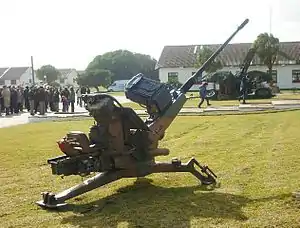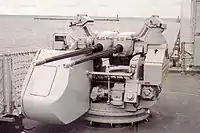| Oerlikon KCB | |
|---|---|
 HS.661 | |
| Type | Autocannon |
| Specifications | |
| Mass | 138 kg |
| Barrel length | 75 caliber |
| Cartridge | 30×170mm |
| Calibre | 30mm |
| Barrels | 1 |
| Action | Gas-operated |
| Rate of fire | 600 round/min |
| Muzzle velocity | 1,080 m/s (3,500 ft/s) |
| Effective firing range | 3,000 m |
The KCB is a 30 mm caliber autocannon, developed by Hispano-Suiza as HS.831.[1] When Oerlikon purchased Hispano's armaments division, the gun became KCB.[1]
Development
HS.831 is a scaled-up version of the 20 mm HS.820 and has much the same general operating principles.[1] It uses the 30x170mm round that was developed for this gun.[2] On ground, the HS.820 was used in combination with the HS.661, a single simple anti-aircraft gun mount,[3] and was also mounted on the AMX-13 DCA (Défense Contre Avions), a self-propelled anti-aircraft weapon for the French Army.[4]
In the United Kingdom, BMARC developed A32, a locally operated naval mounting incorporating two HS.831.[1] When the gun was renamed KCB, the A32 became GCM-A series.[1] And LSE (Laurence, Scott & Electricmotors Ltd; presently MSI Defence Systems) also developed a single mount for KCB, which became DS30B.[1] Both GCM-A and DS30B were introduced by the Royal Navy.[1]
The United States Navy designated the twin HS.831 weapons system developed by Emerson Electric as EX-74.[5] This mount was commercialized as the Emerlec 30 and appreciated by foreign navies.[5]
 HS.661 on display at GADA 601 barracks
HS.661 on display at GADA 601 barracks AMX-13 DCA on display at Musée des Blindés
AMX-13 DCA on display at Musée des Blindés GCM-A on board HMS Battleaxe
GCM-A on board HMS Battleaxe.JPG.webp) DS-30B on board HMS Blyth
DS-30B on board HMS Blyth
References
- 1 2 3 4 5 6 7 Friedman 1997, pp. 459–460.
- ↑ "30mm Rarden". Retrieved November 4, 2022.
- ↑ Cullen & Foss 1992, p. 201.
- ↑ Cullen & Foss 1992, pp. 63–65.
- 1 2 Friedman 1997, p. 464.
Books
- Cullen, Tony; Foss, C.F. (1992), Jane's Land-Based Air Defence 1992-93 (5th ed.), Jane's Information Group, ISBN 978-0710609793
- Friedman, Norman (1997), The Naval Institute Guide to World Naval Weapon Systems 1997-1998, Naval Institute Press, ISBN 978-1557502681